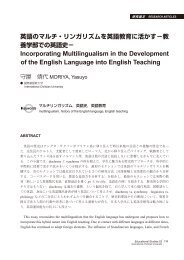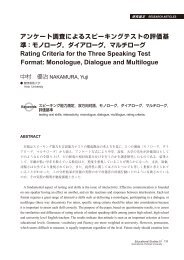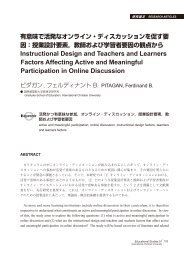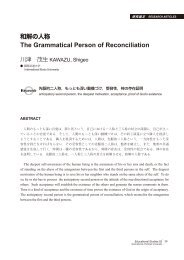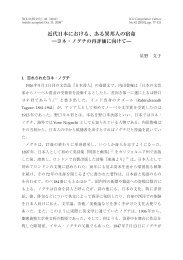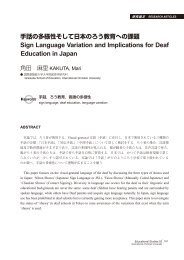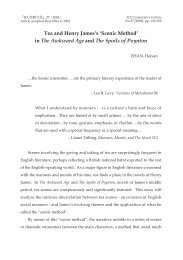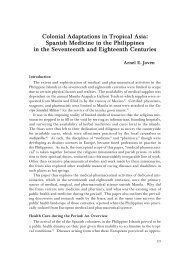The Culture of Music and Ritual in Pre-Han Confucian - subsite
The Culture of Music and Ritual in Pre-Han Confucian - subsite
The Culture of Music and Ritual in Pre-Han Confucian - subsite
You also want an ePaper? Increase the reach of your titles
YUMPU automatically turns print PDFs into web optimized ePapers that Google loves.
with its emphasis on the ren (<strong>in</strong>terpersonal moral sensitivity) that perceives all th<strong>in</strong>gs as one body.<br />
13) Ren is usually translated, not without awkwardness, as “benevolence,” “humanity,” “humaneness”<br />
or “humanheartedness.” Roger Ames suggests a more holistic sense <strong>of</strong> the mean<strong>in</strong>g <strong>in</strong> us<strong>in</strong>g “authoritative<br />
conduct” or “authoritative personhood.” This may obscure what seems to be the core<br />
sense <strong>of</strong> the word, “sensitive empathy for other people,” but it does suggest the aspects <strong>of</strong> centeredness,<br />
calmness, firm moral commitment <strong>and</strong> dignified self-control. Some characteristics <strong>of</strong><br />
ren as expla<strong>in</strong>ed by Confucius are: the ren person takes on difficulties first <strong>and</strong> leaves enjoyment<br />
<strong>and</strong> acquisition till later; he is able to be constantly joyful without anxieties <strong>and</strong> bear poverty<br />
without compla<strong>in</strong>t, to be free <strong>of</strong> evil as long as his will is directed toward ren. <strong>The</strong> person <strong>of</strong> ren<br />
takes delight <strong>in</strong> mounta<strong>in</strong>s, <strong>and</strong> he is tranquil <strong>and</strong> long-lived. Wish<strong>in</strong>g to establish himself, he<br />
first establishes others, <strong>and</strong> wish<strong>in</strong>g to achieve someth<strong>in</strong>g he first helps others to achieve it. Ren is<br />
to overcome the self <strong>and</strong> return to ritual propriety, <strong>and</strong> not to act toward others as you would not<br />
wish them to act toward oneself. Ren is to love people.<br />
14) Ichihara’s <strong>in</strong>terpretation here steps a bit far from the orig<strong>in</strong>al text <strong>and</strong> is difficult to translate, but<br />
it appears cogent: “Because the heart responds to th<strong>in</strong>gs <strong>in</strong> a great variety <strong>of</strong> ways, <strong>in</strong> the voice<br />
there naturally occur many changes. <strong>The</strong> changes <strong>in</strong> the voice that produce harmonious [tunes]<br />
are called y<strong>in</strong>. When these y<strong>in</strong> are accompanied by musical <strong>in</strong>struments, <strong>and</strong> a dance is performed<br />
with the use <strong>of</strong> the ritual implements <strong>of</strong> K<strong>in</strong>gs Wen <strong>and</strong> Wu, this is called ‘music.’ “ Legge<br />
<strong>in</strong>terprets the phrase “accompanied by musical <strong>in</strong>struments” as “so as to give pleasure,” s<strong>in</strong>ce the<br />
character for “music” <strong>and</strong> the character for “pleasure” are the same, simply read with different<br />
pronunciations.<br />
15) One ancient mean<strong>in</strong>g <strong>of</strong> wenzhang that seems <strong>of</strong> relevance here is “mixed colors or patterns,”<br />
which occurs <strong>in</strong> the critique <strong>of</strong> music <strong>in</strong> the Mozi <strong>and</strong> aga<strong>in</strong> <strong>in</strong> the History <strong>of</strong> the Later <strong>Han</strong> (Houhan<br />
shu). Wenzhang also occurs <strong>in</strong> the text <strong>of</strong> the Liji (Da Zhuan chapter), where Zheng Xuan glosses it<br />
as lifa–the rules <strong>of</strong> ritual, <strong>and</strong> another commentator as “a system <strong>of</strong> ritual <strong>and</strong> music” (liyue zhidu).<br />
Legge translates it here as “the elegances (<strong>of</strong> ceremony).” A similar usage occurs <strong>in</strong> Analects<br />
8:19, where it is translated by Legge as “elegant regulations.” For the precise quotations <strong>and</strong> further<br />
mean<strong>in</strong>gs, see the entry on wenzhang <strong>in</strong> the H<strong>and</strong>ian on-l<strong>in</strong>e dictionary.<br />
16) A modern Japanese translator <strong>of</strong> the Liji, Ichihara Kōkichi, expla<strong>in</strong>s the mean<strong>in</strong>g <strong>of</strong> y<strong>in</strong>/on here as<br />
ongyoku, which <strong>in</strong> Japanese traditional music usually means a light popular tune, <strong>and</strong> <strong>in</strong> Noh drama<br />
refers to the s<strong>in</strong>g<strong>in</strong>g <strong>and</strong> musical/rhythmical accompaniment as apart from the visual elements<br />
<strong>of</strong> the performance. See Ichihara Kōkichi, Imai Kiyoshi, Suzuki Ryūichi, comp. <strong>and</strong><br />
trans., Raiki, vol. 2 (Tokyo: Shūeisha, 1977), 406. Legge similarly translates y<strong>in</strong> as “airs” (see Ch<strong>in</strong>ese<br />
Text Project Yueji 3 to 6).<br />
17) <strong>The</strong> commentary by Zheng Xuan po<strong>in</strong>ts out that the first two ceremonial objects named were<br />
used <strong>in</strong> the dance <strong>of</strong> K<strong>in</strong>g Wu <strong>and</strong> the second <strong>in</strong> the dance <strong>of</strong> K<strong>in</strong>g Wen. K<strong>in</strong>gs Wen <strong>and</strong> Wu, the<br />
second the son <strong>of</strong> the first, were the founders <strong>of</strong> the Zhou dynasty.<br />
18) Yueji 13, as translated by James Legge (see CTP). Like all <strong>of</strong> the Yueji, the four-character structure<br />
<strong>and</strong> the parallelism <strong>of</strong> this passage make it very beautiful to read <strong>in</strong> the orig<strong>in</strong>al classical<br />
Ch<strong>in</strong>ese, a beauty <strong>of</strong> sound, rhythm <strong>and</strong> imagery that is completely destroyed <strong>in</strong> translation.<br />
19) From passage 30, <strong>in</strong> my translation.<br />
20) It took a vast quantity <strong>of</strong> gross abuses on the part <strong>of</strong> the clergy <strong>and</strong> popes <strong>of</strong> the Catholic Church,<br />
surfac<strong>in</strong>g repeatedly <strong>in</strong> public awareness over hundreds <strong>of</strong> years, to f<strong>in</strong>ally br<strong>in</strong>g about the Protestant<br />
Reformation, <strong>and</strong> even then the rebellion was only successful because <strong>of</strong> the pr<strong>in</strong>t<strong>in</strong>g press<br />
<strong>and</strong> the fragmented nature <strong>of</strong> political power <strong>in</strong> Germany. Yet whether the result<strong>in</strong>g dim<strong>in</strong>ution<br />
or demise <strong>of</strong> the “cosmic power” <strong>of</strong> Christian ritual <strong>in</strong> Protestant l<strong>and</strong>s (Weber’s “disenchantment”<br />
<strong>of</strong> the world) was a loss or a ga<strong>in</strong> for civilization depends on one’s po<strong>in</strong>t <strong>of</strong> view regard<strong>in</strong>g<br />
the character <strong>of</strong> “modernity” as opposed to cultures deeply rooted <strong>in</strong> tradition.<br />
21) Strictly speak<strong>in</strong>g what is stated first is that all y<strong>in</strong> (see below) is/are born from the human heart,<br />
<strong>and</strong> somewhat later (Yueji 2) that music (yue) is born from y<strong>in</strong>, its root be<strong>in</strong>g <strong>in</strong> the human heart<br />
when it is moved by external th<strong>in</strong>gs.<br />
22) Appropriately, <strong>in</strong> colloquial English, a person considered to be old-fashioned or bor<strong>in</strong>gly conventional<br />
<strong>in</strong> attitude or behavior is called “square,” <strong>and</strong> a person whose character is well balanced is<br />
122



